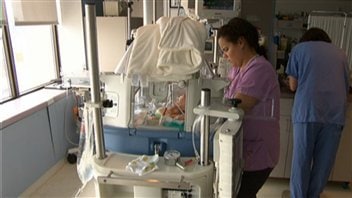Medical advances mean babies born between 22 and 25 weeks gestation may survive in Canada, but between 14 and 31 per cent of them will have severe developmental problems by school age, according to a recent study. Researchers in Ottawa pooled data from previous research on 700 children to get their results.
“The study came out of our interest in Ottawa to have the most accurate possible data on the long-term outcomes of children who are born at an extremely premature age in order to share that information with parents…to help make decisions about planning the care for their …infant,” said Dr. Gregory Moore, neonatologist at the Children’s Hospital of Eastern Ontario.

Intensive care or palliative care
At 25 weeks babies are typically given the intensive medical care they need to survive. Below 22 weeks babies are not expected to survive. But at 23 and 24 weeks parents and doctors must decide whether to offer intensive care or palliative care. There are no clear guidelines and there is no law. But this study can go a little way in helping them predict whether it is kinder to let nature take its course or to take extraordinary steps to save the child.
The study looked at four measures of severe impairment: cognitive or thinking ability, cerebral palsy or difficulty moving limbs, vision impairment or blindness and hearing impairment or deafness.
Each baby is different
Babies born full term have a 4 per cent chance of having this kind of severe impairment and the chances are much higher for those who are very premature. Moore is quick to point out that every baby is different and it is impossible to predict for sure how individual infants will develop.
There are limitations to this study because there are few very early term babies who survive so the sample is small. And definitions of severe impairment may vary from study to study.
However Moore says the results are useful in helping guide doctors and parents on caring for very premature babies now and will provide a bench mark to study whether outcomes improve in the future.







For reasons beyond our control, and for an undetermined period of time, our comment section is now closed. However, our social networks remain open to your contributions.